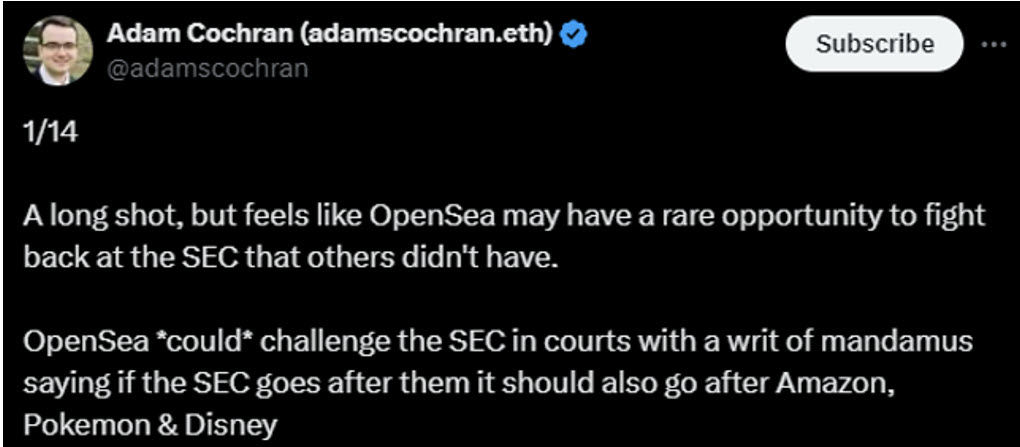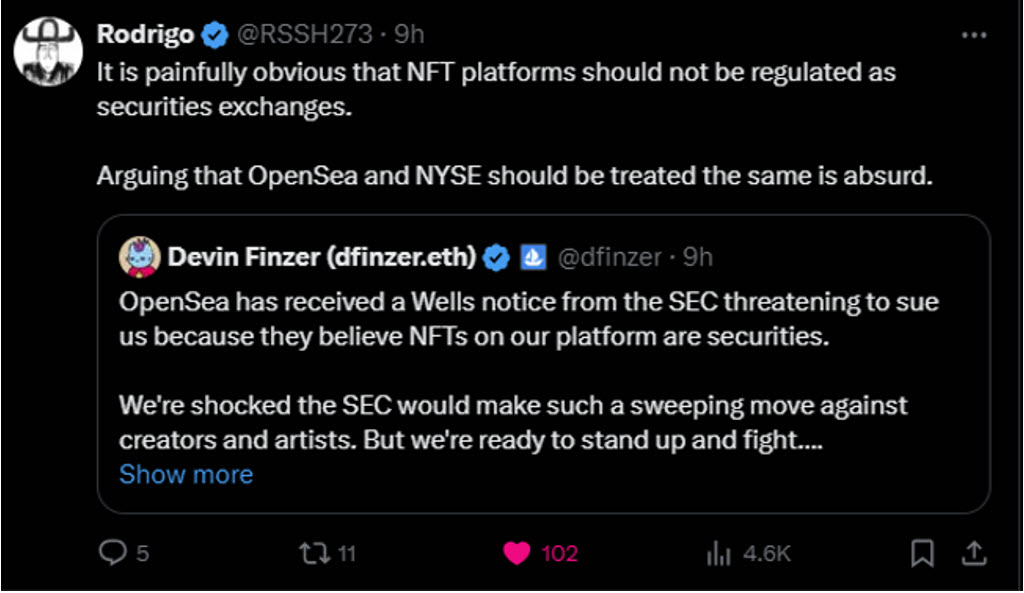- within Technology topic(s)
- with Senior Company Executives, HR and Inhouse Counsel
- with readers working within the Oil & Gas industries
Michael Bacina, Steven Pettigrove, Jake Huang, Luke Higgins and Luke Misthos of the Piper Alderman Blockchain Group bring you the latest legal, regulatory and project updates in Blockchain and Digital Law.
Kraken margin product caught in regulatory net
Kraken, one of the world's largest crypto exchanges, has been locked in a legal battle with Australia's corporate watchdog, the Australian Securities and Investments Commission (ASIC), since September last year over a margin lending product. The Federal Court has now ruled that Kraken's Australian arm, Bit Trade Pty Ltd, breached the far reaching design and distribution obligations (DDO) arising under theCorporations Act 2001(Cth) (Corporations Act) by offering a margin extension product to retail customers without first preparing a Target Market Determination (TMD).
Kraken's Margin Extension product
Kraken's "Margin Extension" product allowed its users to buy cryptocurrency on margin, provided the user had a minimum balance of certain crypto-assets in their account to be used as collateral. Customers could receive an extension of up to five times the value of their collateral. Margin may be extended in fiat or digital currencies. If a customer's collateral fell below a required minimum, Kraken could sell the customer's crypto-assets and apply the proceeds to repay the margin extension such that the customer's collateral reached the minimum requirement. In the present case, the Court found that Kraken's terms also required the customer to repay margin extended in fiat currency in the same currency where they became ineligible to use the product.
The DDO and ASIC's case
Under DDO, the issuer of a financial product (and some products which aren't ordinarily financial products) must make a "target market determination" prior to the financial product being offered to consumers. A target market determination must, inter alia, describe the class of retail clients that comprises the target market for the product. The target market determination must be such that it would be reasonable to conclude that, if the product were to be issued or sold to a retail client in the target market, "it would likely be consistent with the likely objectives, financial situation and the needs of the retail client" (Corporations Act, s 994B(8)).
It was common ground between the parties that the product in question did not constitute a financial product for licensing purposes under Division 3 of Chapter 7 of the Corporations Act. However, ASIC argued that the Margin Extension product did meet the extended financial product definition which apply for the purpose of DDO obligations under Section 994AA of the Corporations Act (which refers to Division 2 Part of the Australian Securities and Investments Commission Act 2001 (Cth) (ASIC Act) and thus required the preparation of and publication of a TMD and implementation of accompanying systems and controls to ensure distribution of the product in accordance with the TMD.
The financial product definition in the ASIC Act includes a "credit facility". ASIC argued that:
- when Kraken extended credit in the form of "national currency" (i.e., a fiat or sovereign currency), it created a deferred debt, effectively making the product a credit facility under the ASIC Act; and
- that the obligation to repay cryptocurrency could amount to a credit facility for the purposes of the ASIC Act.
Kraken sought to rely on an exemption in reg 7.8A.20 of the Corporations Regulations 2001 (Cth) on the basis that the product was not in the nature of a deferred debt, but rather a "financial accommodation".
The judgment
Justice Nicholas agreed with ASIC's contention that an extension of margin repayable in national currency could constitute a deferred debt within the meaning of the ASIC Act and accompanying regulations, meaning Kraken's margin product required the issuance of a target market determination defining the appropriate target market for the product.
However, his Honour also ruled that when credit was extended in crypto-assets, it did not amount to a deferred debt, on the basis that it did not involve an obligation to repay money (as crypto-assets are not money) and noting that a failure to repay may still sound in damages for breach of contract, rather than being directly recoverable as a debt.
The outcome and penalties
ASIC hailed the ruling as a victory, with Deputy Chair Sarah Court saying:
We initiated proceedings to send a message to the crypto industry that we will continue to scrutinise products to ensure they comply with regulatory obligations in order to protect consumers...
However, Kraken has signalled it will seek to rely on Section 1317S of the Corporations Act, which permits a court to relieve a party from penalties where a party has acted honestly and ought to be relieved of liability in all the circumstances.
This defence was recently relied upon successfully by Block Earner in its case against ASIC. That decision is now under appeal. The case nevertheless highlighted the need for product issuers, particularly those dealing in crypto-assets, to obtain early legal advice from a reputable firm before launching products or services in order to mitigate the risk of penalties in the event the product is later found to be a regulated offering.
ASIC's initial case against Kraken kicked off in September 2023, after the regulator accused the exchange of operating without a TMD for its margin trading product, despite warnings. Kraken's Managing Director, Jonathon Miller, voiced his frustration at the time in a statement to the Australian Financial Review, saying the company had been trying to work constructively with ASIC and otherwise underscored Kraken's desire for clearer regulatory guidance – a desire that is shared by the entire blockchain industry.
Reports of the difficulty of engaging with ASIC by other crypto-businesses are consistent with Mr Miller's comments, and it would seem a far more constructive use of scare taxpayer dollars for ASIC to engage in publishing clear guidance and good-faith engagement with crypto-businesses.
This case reflects ASIC's outweighed scrutiny of crypto-asset related product offerings, and a willingness to continue testing the limits of their DDO powers in the absence of providing clear guidance or engagement to provide pathways to compliance for crypto-asset businesses, something which ASIC considers is not within it's remit.
In its latest media release addressing the Kraken decision, ASIC makes a strange assertion that:
Entities providing crypto-related products should be aware that many such products are financial products.
This kind of statement has appeared increasingly in ASIC communications in relation to recent enforcement and it stands in stark contrast to their submissions to the Australian Senate in 2017 that:
ASIC's view is that Bitcoins themselves (and other virtual currencies) are not financial products and are not regulated under the legislation we administer.
No explanation or reasoning has been provided for the change in position of evolution of thinking on ASIC's part and understanding the proper legal basis for this movement would be of great assistance to the industry as a whole and potentially avoid wasteful regulation by enforcement. Clear guidance and rule-making with pathways to compliance for crypto-asset products is essential if Australia is to harness the benefits of these innovations.
The outcome of Kraken's s1317S application, as well as the appeal from Block Earner's s1317S decision, will be closely followed by the industry as regulation by enforcement unfortunately continues in Australia.
A copy of the judgment can be found here.
China updates AML guidance to cover virtual assets
China's supreme court and public prosecutor have recently updated their interpretation of the Anti-Money Laundering (AML) law to include "virtual asset" transactions for the first time.
During a conference on 19 August, the Supreme People's Court and the Supreme People's Procuratorate – the country's highest level court and prosecutor – jointly announced the new interpretation, which now recognises "virtual asset" transactions as a method of money laundering.
The interpretation also clarifies that
transferring or converting proceeds of crime and relevant gains through virtual assets transactions... may constitute an offence of disguising and concealing the source and nature of criminal proceeds and illicit gains through other means...in the Criminal Law
Penalties for violation range from a minimum fine of 10,000 Chinese yuan ($1,400) to 200,000 yuan ($28,000) for more serious offenses, along with potential jail terms of five to ten years.
Such interpretative guidance is often issued by the two top judicial bodies in China as "de facto" laws, providing important guidance on how the laws should be interpreted and enforced by lower courts and prosecutors. In practice, they are treated as valid source of legal authority and generally complied with.
Other revisions provide clearer guidelines on what constitutes "serious circumstances" in money laundering cases, including refusal to cooperate with authorities or laundering amounts exceeding 5 million yuan ($700,000). In 2023, the Supreme People's Procuratorate reported prosecuting 2,971 individuals for money laundering, a significant rise from 2019.
This change also coincides with recent social media speculation about China potentially lifting its blanket ban on cryptocurrency (i.e. banning all commercial exchange and public-fund raising using cryptocurrency). Notably, Justin Sun, founder of Tron and crypto exchange HTX, posted a tweet on 19 August asking what the best meme to suit China's unbanning of crypto would be.
However, some experts remain doubtful. Mikko Ohtamaa, co-founder of Trading Strategy, argued that reversing the crypto ban would contradict the government's political agenda.
In related news, police in the Chinese city of Qingdao are prosecuting a case involving a network accused of using stablecoin Tether (USDT) to launder over 8 million yuan ($1.1 million) for criminal enterprises. Authorities allege that three main suspects recruited friends to use their business licenses and IDs to open accounts used for receiving money from criminals. The funds were then converted into USDT and returned to the criminals, with the syndicate earning a commission. Nine individuals are currently facing charges and awaiting prosecution.
The state of cryptocurrency is interesting in China. Despite its ban on cryptocurrency, the government has continued to make forays into digital asset by launching its own NFT marketplace, building a new blockchain network and issuing a world-leading central bank digital currency. Not to mention the efforts by Hong Kong to establisha licensing framework for virtual asset service providers, and promulgating regulations for stablecoins and tokenisation.
Down the Well(s notice) or to the OpenSea – rough sailing ahead for NFT markets?
OpenSea, a leading marketplace for NFT collections, trading and sales reported today that they had received a Wells Notice from the US Securities and Exchanges Commission (SEC). A Wells Notice is a kind of "show cause" document used where the SEC has conducted an investigation and may commence a prosecution and is saying to the recipient "tell us why we shouldn't sue you".
The continued regulation by enforcement approach of the SEC was noted by OpenSea, who said:
for those who have been following the political and regulatory landscape around crypto more closely, the reaction is more one of weariness and disappointment. Cryptocurrencies have long been in the crosshairs of the SEC. But, by targeting NFTs, the SEC is diving into new, uncharted waters, with potentially harmful consequences for consumers, creators, and entrepreneurs alike
This Wells Notice follows popular songwriters Jonathan Mann and Brian L. Frye suing the SEC to try and ensure their One Song A Day NFTs will not be labeled securities under US law:

Mann and Frye promptly made their song for today about OpenSea to continue their protest against regulatory overreach.
Respected Web3 figure Adam Cochran ran an interesting thought experiment, suggesting OpenSea should respond with an action for mandamus, an ancient action asking a court to compel the government to do something to fulfil their proper function, in this case, if OpenSea is to be sued, that all other operators of collectible marketplaces be investigated and sued:

While others poured cold water on the legal issues and likelihood of success of such a strategy, it draws attention to the double standard of non-blockchain digital assets, like Pokemon digital cards and other collectibles, long being considered (rightly) not any kind of security, even if people have purchased them with a hope of making a return.
Others pointed out the illogic in this approach.

Rodrigo from Paradigm was particularly brutal:

And Congressman Wiley Nickel (R) said:
The aggressive use of "regulation by enforcement" from @SECGov is a blatant abuse of power that erodes trust and transparency in our regulatory system.
OpenSea has also stepped up and pledged a USD$5M fund to cover legal fees for any artists who also receive a Wells Notice. It's worth noting that even if the NFTs on open sea are securities, there is no current practical way under US law for them to be issued and sold, so it would seem preferable policy for resources to be directed to engagement and rule-making to put reasonable protections in place for consumers (if needed), and prevent inefficient regulation-by-enforcement of crypto-businesses.
Despite the apparent aggression from the regulator, OpenSea remains open in their approach, saying:
We hope that the SEC will reconsider its stance and approach this issue with the open-mindedness it deserves.
The sooner openminded collaborative approaches to crypto-regulation set in, to give users the products they want with reasonable protections from bad actors, the better the outcomes will be for the whole industry and consumers.
Martin Shkreli's Wu-Tang war: the legal clash over 'Once Upon a Time in Shaolin'
Martin Shkreli is back in the spotlight, and this time it's not for price gouging or securities fraud, but for his contentious handling of the Wu-Tang Clan's one-of-a-kind album, Once Upon a Time in Shaolin.
Shkreli originally bought the album in 2015 for USD$2 million, a move that instantly caught the public's eye. However, after his legal troubles culminated in a seven-year prison sentence for securities fraud, the US Government seized the album as part of a USD$7.4 million penalty.
In 2021, the album was sold to PleasrDAO, a digital autonomous organisation, for USD$4.75 million. PleasrDAO aimed to preserve the album as a unique cultural artefact and tied its ownership to a non-fungible token (NFT), which 74 members collectively own.
As it turns out, Shkreli made digital copies of the album before it was seized. In June 2022, he revealed during a YouTube livestream that he had stashed MP3 copies in safes worldwide.
Shkreli then began taunting PleasrDAO members, claiming to have played the album for thousands of people on his Discord and boasting about distributing copies to various individuals. He even hinted at the album's availability on torrents and hosted listening parties on his social media accounts, which reportedly reached nearly 5,000 listeners.
PleasrDAO has since filed a lawsuit against Shkreli, alleging that his actions violate the asset forfeiture order and misappropriate what they describe as "trade secrets." The DAO argues that by distributing copies of the album, Shkreli has diminished its market value and breached the agreement under which they purchased the album. They are seeking a federal court order to prevent Shkreli from further distributing or using the album's contents and to obtain a list of individuals who have received copies.
Shkreli's defence is straightforward: he claims that as the original buyer of the album, he legally owned 50% of its copyright and was entitled to make copies. He argues that the government's seizure only pertained to the physical copy of the album, not the digital versions he had created beforehand. Furthermore, he contends that the album is no longer a "trade secret" since its contents have been widely disseminated.
On 26 August 2024, a federal judge issued a preliminary injunction against Shkreli, barring him from possessing, using, or distributing any copies of the album. He is also required to surrender all existing copies to his defence counsel and submit a list of individuals who have received them by the end of September 2024.
As the case progresses, it raises intriguing questions about the intersection of copyright, asset forfeiture, and intellectual property in the age of NFTs. While PleasrDAO and Shkreli prepare for a courtroom showdown, the broader implications for how unique digital and physical assets are managed and protected remain to be seen.
SEC challenges Solana ETFs
The United States Securities and Exchange Commission (SEC) has halted the progress of two proposed Solana ETFs, ostensibly on the grounds that the SEC regards the Solana token as an unregistered security under US law, according to a report by the Block.
The applications (known as 19b-4 applications) filed by Cboe BZX Exchange on behalf of the ETF's issuer were rejected by the SEC, resulting in their withdrawal from the exchange's website.
The continued regulatory scrutiny of the SEC, which is well documented, came after discussions between the SEC and the issuers, during which the SEC reportedly reiterated its view that Solana (SOL) should be classified as a security.
The SEC has argued that the SOL token is a security in multiple Court actions, but has not initiated any action directly against the developers of the Solana blockchain.
The 19b-4 applications are sometimes submitted by securities exchanges to initiate the SEC's approval process for new financial products. However, since these applications were not accepted (unlike the Ethereum ETFs which were approved in July), they did not make it to the Federal Register for review.
The issuers behind the proposed Solana ETFs, 21Shares and VanEck, are still listed on the SEC's EDGAR database, suggesting they have not abandoned their efforts entirely. Despite the setback, the issuers may seek to launch new arguments in order to gain approval.
The SEC has not made a public announcement regarding the rejection.
The content of this article is intended to provide a general guide to the subject matter. Specialist advice should be sought about your specific circumstances.





